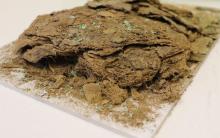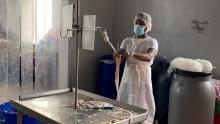Clothing industry
Second-Hand Clothes: A €7 Billion Contribution to Europe’s GDP and a Greener Future
The textile industry is known to be one of the most environmentally damaging sectors globally, accounting for 10% of carbon emissions and 20% of drinking water pollution. According to Karina Bolin, CEO of Humana People to People Bulgaria, the use of reusable items can significantly mitigate this impact, reducing environmental harm by as much as 70 times.
How the Greek chains Glou, Sprider stores, Raxevsky, Tsantilis, Lussile, and Gavala went bankrupt
The branded Greek clothing sector, in all its variations, has written significant pages of success in the past. Even today, there are companies that, despite adversities, remain standing against fierce foreign competition, maintaining a significant market presence and a notable export percentage.
France cracking down on low-cost fast fashion
France's parliament has backed a string of measures making low-cost fast fashion, especially from Chinese mass producers, less attractive to buyers.
The vote makes France the first country in the world "legislating to limit the excesses of ultra fast fashion", said Christophe Bechu, minister for the ecological transition.
- Read more about France cracking down on low-cost fast fashion
- Log in to post comments
Textile Waste Crisis: Over 100,000 Tonnes Disposed Annually in Bulgaria
A staggering amount of over 100,000 tonnes of textiles is discarded annually in Bulgaria, a study reveals, spotlighting the nation's looming textile waste crisis. Startling statistics indicate that merely 2% of this colossal amount undergoes recycling, while an estimated 50% to 70% remains suitable for continued use, according to the Association for Textile Recycling.
Indian textile roadshow held in Istanbul
The Consulate General of India in Istanbul held a special roadshow on the Indian textile sector in Istanbul on Dec. 6.
The special event was a curtain raiser to "Bharat Tex 2024," a textile mega event to be held in India from Feb. 26-29 next year in the capital New Delhi, the consulate general said in a statement.
- Read more about Indian textile roadshow held in Istanbul
- Log in to post comments
Motorists should only fill up after sunset, Environment Ministry says
Motorists have been advised to only fill up their vehicles after sunset due to the "Kleon" heat wave.
The Ministry of Environment and Energy has also urged motorists to cut down on the use of their cars in favor of public transport as the heat leads to the accumulation of pollutants in the air.
Ancient textiles draw archaeologists’ interest
A folded piece of ancient fabric discovered in a funerary urn at an archaeological dig in Athens in the 1980s is prepared for a CT scan. New imaging technology has spurred interest in ancient fabrics, with the Greek Ministry of Culture taking part in EuroWeb, a European network of scholars and stakeholders dedicated to the history and conservation of textiles and related crafts.
- Read more about Ancient textiles draw archaeologists’ interest
- Log in to post comments
Companies keep eye on financing, costs in 2023
Companies operating in the services, real eatate sectors and export-oriented industries are keeping a close eye on finance and costs in 2023.
Uncertainties over energy security, supply-related issues and the EU's carbon tax will be high on Turkish companies' agenda in the new year.
But most industries are mainly concerned about energy costs and access to financing.
- Read more about Companies keep eye on financing, costs in 2023
- Log in to post comments
Bananas to fish scales: Fashion’s hunt for eco-materials
Sneakers made from banana or pineapple leaves, dresses from nettles or fish scales, the search for sustainable materials has taken the fashion industry to some wild places.
Experts warn these new textiles are not a quick fix for fashion's enormous problems with over-consumption and waste, but may be a necessary step in developing cleaner technologies.
Asian Migrants Fill Jobs That Picky Albanians Now Spurn
Haque is one of 10 Bangladeshi workers employed by the INCA factory in Lezha. The manager says Albania no longer supplies enough labour, forcing him to seek workers far away.
"I plan to stay here for a long time because I have no other solution," Abudalep, 28, another Bangladeshi migrant employed at the INCA factory told BIRN. "In my country there is no work," he adds.









